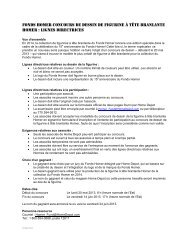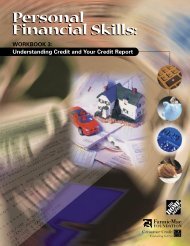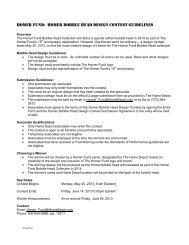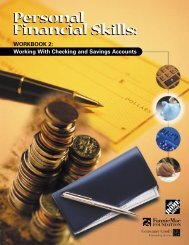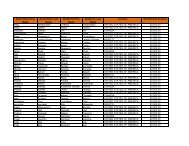Getting a Loan - The Homer Fund
Getting a Loan - The Homer Fund
Getting a Loan - The Homer Fund
- No tags were found...
Create successful ePaper yourself
Turn your PDF publications into a flip-book with our unique Google optimized e-Paper software.
Forgery – When a person purposefully tries to withdraw money from your account by pretending to beyou.Gross annual income – Total yearly income from all sources before taxes are deducted.Hold – <strong>The</strong> number of days a financial institution will hold a check before crediting your account.Installment credit – This type of credit allows you to borrow a specific amount of money at one time for adefined purpose. You make a set payment each month.Interest – A fee paid for the use of money. A financial institution will pay you interest for keeping yourmoney at their location. You will pay interest to a financial institution for the use of borrowed funds.Joint applicant – When two or more people apply together for a loan.<strong>Loan</strong> processing – <strong>The</strong> steps a lender takes to decide if a buyer can qualify for a loan.Long-term goals – Savings goals you can accomplish by consistently setting aside money for severalyears.Luxury expenses – Monthly costs that you choose, such as new clothes and going out for meals.Market economy – An economic system where goods and services must be purchased from others.Market value – <strong>The</strong> expected sale price of something.Minimum balance – Necessary amount of money on deposit to qualify for special services.Minimum payment – Smallest possible monthly payment.Monthly statement – Account summary mailed monthly to a customer.National Credit Union Share Insurance <strong>Fund</strong> (NCUSIF) – Insures accounts at federal governmentregulatedcredit unions for up to $100,000 per account.Net income – Your total income after taxes are taken out.Noninstallment or service credit – Some businesses and utility companies offer this type of credit. Itallows you to pay for a used service at a later date.Nonsufficient funds (NSF) – A term meaning that the amount of money in your account is less than theamount you would like to withdraw. Also referred to as insufficient funds.Nontraditional credit history – A credit history you can prepare if you do not have credit cards or havenever had a loan. It can include receipts and canceled checks from your monthly payments for rent, utilities,and other bills.Overdraft protection – A line of credit to cover nonsufficient funds.Overdrawn – When more is withdrawn from an account than the existing balance.Payment factor table – A table that you can use to calculate monthly payments and the cost of credit forinstallment loans.Personal identification number (PIN) – Your password to your account at a financial institution. Youcan use your PIN to gain access to your account at an ATM or point of sale terminal (POS).40



